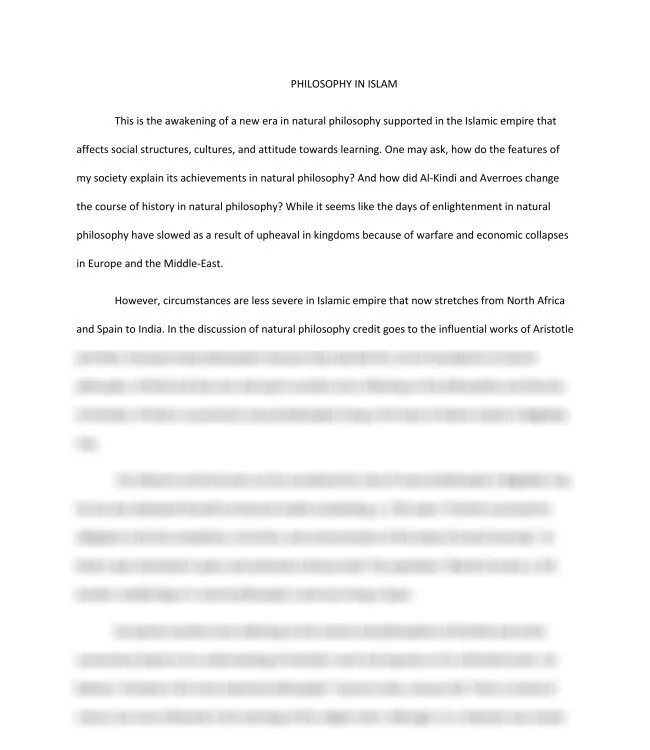PHILOSOPHY IN ISLAM This is the awakening of a new era in natural philosophy supported in the Islamic empire that affects social structures, cultures, and attitude towards learning. One may ask, how d
PHILOSOPHY IN ISLAM This is the awakening of a new era in natural philosophy supported in the Islamic empire that affects social structures, cultures, and attitude towards learning. One may ask, how d
& (Ede (Lecture (Lindberg, (Linderberg, 10). 165) 171). 174) 175) 176) 75), 77) 87). Africa Al-Kindi Although, And Another Arabic Aristotle Aristotle. Aristotle’s Averroes Baghdad, Cormack, Europe Europe. European Forecast Greek He His However, IN ISLAM In India. Iraq. Islam. Islamic It January Latin Middle-East. North Old One Plato, Rome Spain Spain. Testament The There This When While a absence accumulate accumulated achievements active advance advanced advancements affects all also ancient and another another, any are as ask, aspectibus” aspects astronomy, attitude attracted authored available” awakening based be became because been before begun being believes between body book books book’ but by can careless change changed circumstances collapse collapses collections commentary commercial, communication completion, conceived considered constant contributing contribution converting correction, countless course creations credit culture culture, cultures, current days dedicated demography described destroyed destruction did different discoveries discussion disrupted disrupts do document, economic education educational effects embark empire empires enlightenment era essential existed expands expansion explain extreme, famous features fell felt figure five for foreign foundational foundations four freedom from functions future. gain goes governmental great had hard harmony. has have heart hierarchy himself his historical history how human humanity important in influence influential information instead institutions intellectual interested into is it its it’s journey kind kingdom kingdoms knowledge lack laid learning learning. learning.” learning”. legal, less life like little living many mass mathematics mathematics, may meant most much music. my natural neighboring neither never new not notable notes, nothing now number numbers.” obligation of officially on one optics or other over p. participate, peaceful people persecution philosopher philosophers philosopher” philosophies philosophies, philosophy philosophy. philosophy? physical population prohibit prominent promotes purposes. rebuild recover reflecting region. relatively religion religious representatives resources result roots ruins”. rulers”. safe said say says, scholars scholars. scholars’ science science, sciences; see seems severe shared shows side situation six slowed slowly social societies. society spends spent statement states story stretches strong structure structures, studied studies support supported tPHILOSOPHY taught teaching teachings texts, that the them”. theories there they this those three through time to tolerance tolerated towards translated translations transmission two understanding unfinished union. unique universities. upheaval variety war warfare wars was way we were who wide wished with wo work works works. world world. writes writes, ‘0’ ‘People “0” “Al-Kindi “Aristotle “De “Islamic “Mathematics “The “fall “the “they “this
PHILOSOPHY IN ISLAM
This is the awakening of a new era in natural philosophy supported in the Islamic empire that affects social structures, cultures, and attitude towards learning. One may ask, how do the features of my society explain its achievements in natural philosophy? And how did Al-Kindi and Averroes change the course of history in natural philosophy? While it seems like the days of enlightenment in natural philosophy have slowed as a result of upheaval in kingdoms because of warfare and economic collapses in Europe and the Middle-East.
However, circumstances are less severe in Islamic empire that now stretches from North Africa and Spain to India. In the discussion of natural philosophy credit goes to the influential works of Aristotle and Plato, the great Greek philosophers because they had laid the current foundations of natural philosophy. Al-Kindi and Averroes had spent countless time reflecting on the philosophies and theories
